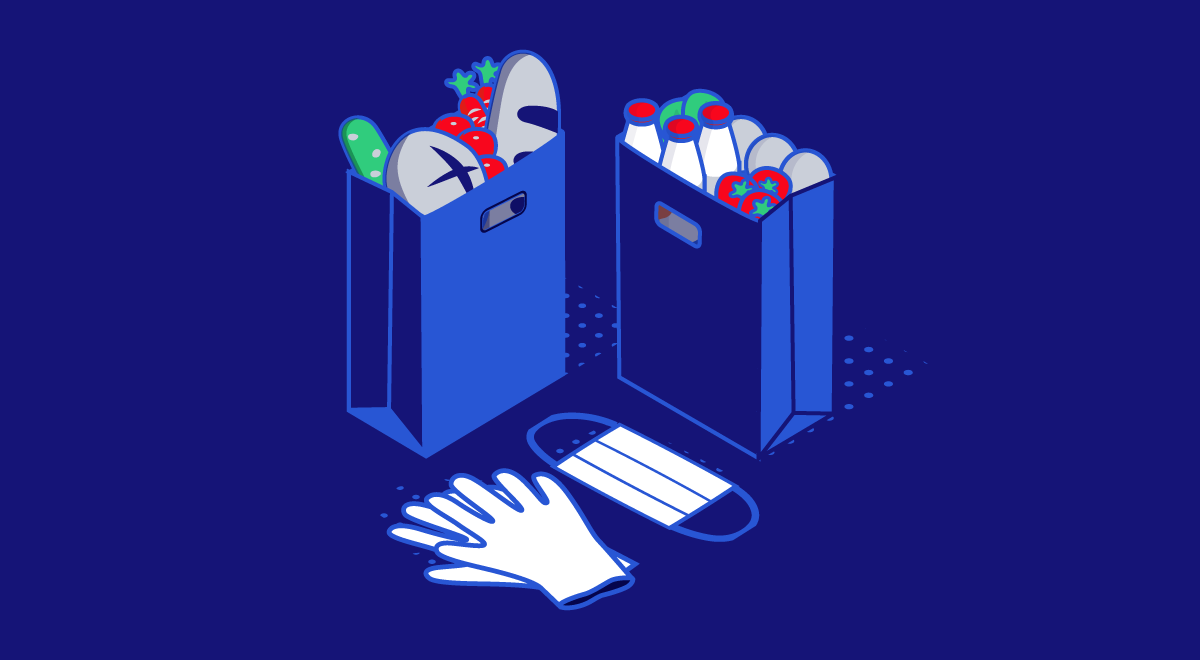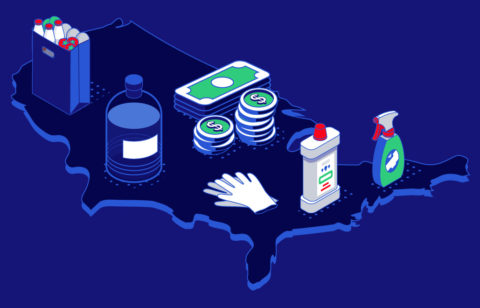The coronavirus pandemic is one of the most challenging public health crises the nation has ever faced. Nearly 90% of Americans are in some sort of lockdown right now, lying low in their homes waiting for the virus’ spread to subside. Many are also out of work right now. If you’re locked down and unemployed, trying to keep enough food in your home during this crisis can be stressful. If you’d like to make sure you have enough food at home without breaking the bank, keep the following tips in mind on your grocery run during coronavirus.
1. Have a Plan
Getting groceries during the COVID-19 pandemic can be stressful enough, so don’t make it worse by hitting the supermarket with no earthly idea of what you need to buy. Make a draft of a shopping list before you leave your house, noting all the key grocery items you need to purchase. During the pandemic, you should use a paper grocery list and leave your phone in the car or at home, to limit the chance of contamination. Then, if you’ve memorized the layout of your local grocery store, finalize your list by arranging your grocery items by the way you plan to move through the aisles in the store. An organized shopping list will help you stay focused, buy the items you need, and avoid costly impulse purchases. A good plan will also get you in and out of the store as expeditiously as possible and help minimize your risk of exposure on your grocery run during coronavirus.
2. Stick to the Essentials
While supermarket shelves have been bare from time to time during this crisis, this is due more to consumers fearfully hoarding food and other supplies than any real food shortage; the grocery supply chains remain strong. You don’t have to shop like it’s the last time you’ll be able to do so. While grocery shopping, buy the essentials that you need to get you through the week. Doing so will help you minimize your monthly food expenditures at a time when there aren’t as many deals available, and the cost of some staples, such as eggs, is high. A minimalist shopping run will also ensure that other people in your community will be able to find the items they need when they get their groceries.
3. Buy Foods That Go a Long Way
If you’re used to eating fresh, perishable foods during normal times, consider adjusting your diet a bit during the coronavirus pandemic. Add items to your menu (and grocery list) that are inexpensive and last a long time. Canned goods, such as soups, stews, tuna, and vegetables, are inexpensive and can stay on your shelves practically forever; they’re great items to buy each week and add to your meal plan. Starches such as rice and dried beans are cheap and versatile as well. Finally, bulk frozen meats and vegetables are great choices for keeping your grocery bills low and your freezer stocked, too. Overall, foods like this will save you money, limit the number of trips you have to take out of your home, and allow you to make good meals while you’re hunkered down and as safe as possible from COVID-19 exposure.
4. Order Your Groceries and Avoid Stores Altogether
One of the best ways to keep grocery costs low and minimize the threat of coronavirus is to avoid stores altogether and have your groceries delivered to your home or apartment. Many grocery stores have some sort of partner delivery service; these stores often let you select your grocery items online or by phone, as well as the time window for home delivery. Using a grocery delivery service isn’t expensive, and it can be a good way to order exactly what you need and minimize monthly grocery costs. Alternatively, you may be able to order your groceries from the store ahead of time, and then pick them up after the store shops them for you. This is another great way to avoid costly impulse shopping and limit your risk of exposure on your grocery run during coronavirus.
5. Buy from Local Producers
Another way to save money, limit your exposure to the virus, and get great food is to buy it from local producers. In many areas, small farms are supplying their communities with produce, dairy products, meat, and poultry. Community Supported Agriculture (CSAs), a type of food subscription service popular with smaller farms, is having a heyday right now; in some areas, the number of people using CSAs has tripled since the beginning of the pandemic. Many CSAs will give you options to choose your items each week; some farms even deliver to their customers each week as well. Find a good CSA operating near you, and you can save money and eat well during this crisis!
Stay Safe Out There
Living under the threat of coronavirus can be very stressful. However, despite the challenges, keeping your grocery run during coronavirus budget-friendly doesn’t have to be an impossible task. Just follow the money-saving shopping tips provided here, and you’ll stay safe and keep your pantry stocked until the COVID-19 threat subsides.





